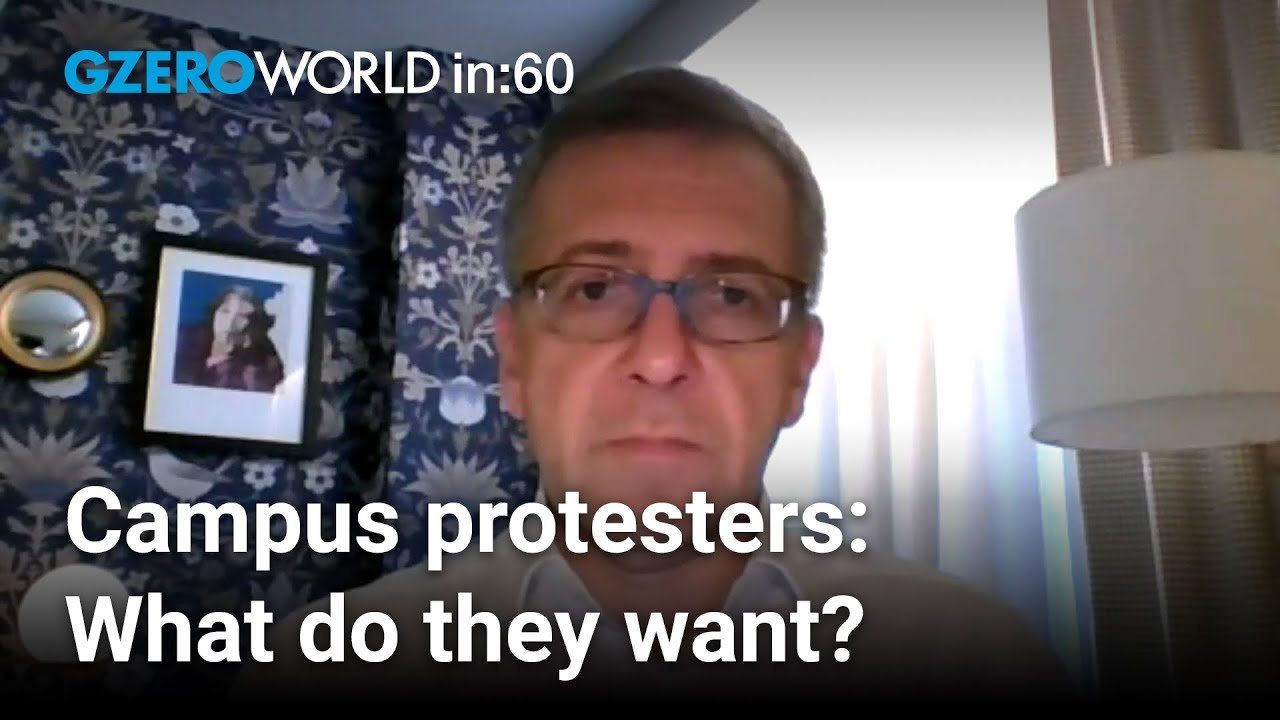Ian Bremmer shares his insights on global politics this week on World In :60.
Why hasn't the United Nations insisted on military observers in Gaza?
Well, the United Nations doesn't really insist on things. And when they do, it's usually symbolic. Like they insist that humanitarian aid needs to get into Gaza and it doesn't happen. Or they insist that, there needs to be protections for the Palestinian civilians or that the Hamas needs to let go, release all of the illegally held hostages, and it doesn't go anywhere. So you can insist all you want. Also, keep in mind the Security Council would be vetoing that sort of thing because the US has a veto and they continue to use it on most Israel-Palestine related resolutions.
What specific demands are being voiced by campus protesters at institutions such as Columbia and Yale?
Well, I mean, the demands that got these protests started, are all about divestment of the endowments of these universities away from any corporations that do business in make money with Israel. Because of the view that the Israeli war in Gaza is wrong, the student protesters called it a genocide and that they want to end that. We've seen that kind of demand in Europe across the board. Not as much in the United States, at least not to this degree. Having said that, now that you also have students that have been suspended and arrested, surely the campus protesters are also saying those things need to be unwound. We're also increasingly seeing demands for university administrators, including presidents, to resign. So, I mean, the longer this goes, the harder it is to actually, accede to these student demands. And of course, the more polarized the environment on the ground in these universities become.
How will US aid package approval shake the dynamic of the Russia-Ukraine war?
Well, it makes it more likely that the Ukrainians can defend their front lines, at least for now. They had been losing some territory. Not a lot, but including one city. And the Russians are planning, with an additional mobilization, a new major offensive, probably end of spring, early summer. Ukrainians have a much better capability to hit back and stop the Russians from making gains there. They had been down to about 20% of the ammunition and artillery being fired against Russia, that the Russians were firing against Ukraine. This brings that back to parity through that offensive. What does this mean for 2025? Still, massive uncertainty and eventually a need to engage in negotiations with a much bigger Russia fighting an illegal war, an invasion with all these war crimes. Is that fair? No. But is that reality? Yes, absolutely. And any NATO leader you talk to privately recognizes that's where this is eventually going.
- Israel’s looming constitutional crisis: What’s the tech sector going to do about it? ›
- College campus watch: The chaos is spreading ›
- Campuses in crisis vs. Capitol Hill calm ›
- Crisis at Columbia: Protests and arrests bring chaos to campus ›
- How campus protests could influence the US presidential election - GZERO Media ›
- Why Israel's Netanyahu continues to antagonize Biden on Gaza - GZERO Media ›
- Why Israel's Netanyahu continues to antagonize Biden on Gaza - GZERO Media ›
- Why campus protests worsen divisions, and how to mediate: Advice from Eboo Patel - GZERO Media ›
More For You
15: The number of migrants who died after their boat accidentally collided with a Greek Coast Guard vessel in the Aegean Sea on Tuesday. Two dozen people were rescued.
Most Popular
Walmart is investing $350 billion in US manufacturing. Over two-thirds of the products Walmart buys are made, grown, or assembled in America, like healthy dried fruit from The Ugly Co. The sustainable fruit is sourced directly from fourth-generation farmers in Farmersville, California, and delivered to your neighborhood Walmart shelves. Discover how Walmart's investment is supporting communities and fueling jobs across the nation.
Democratic Alliance leader John Steenhuisen announced Wednesday that he will not run for a third term as leader of the liberal, pro-business party, after months of internal pressure over a host of controversies – including allegations, since cleared, that he used the party credit card for Uber Eats.
